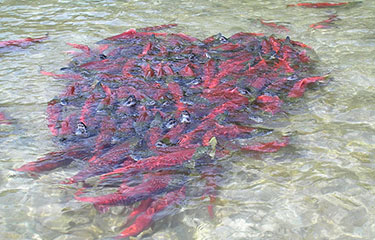The U.S. Environmental Protection Agency has made a another move toward prohibiting development of the proposed Pebble Mine in Alaska’s Bristol Bay watershed.
On 1 December, 2022, EPA Region 10 Administrator Casey Sixkiller transmitted a recommended determination “to prohibit and restrict the use of certain waters in Alaska’s Bristol Bay watershed as disposal sites for certain discharges of dredged or fill material associated with developing the Pebble Deposit.
In a statement announcing his recommendation to agency leadership, Sixkiller said the move was another step toward a “final determination” by the agency, which would effectively block the Pebble Mine.
“If affirmed by EPA’s Office of Water, this action would help protect salmon fishery areas that support world-class commercial and recreational fisheries and that have sustained Alaska Native communities for thousands of years, supporting a subsistence-based way of life for one of the last intact wild salmon-based cultures in the world,” Sixkiller said. “After evaluating an extensive record, including scientific and technical information covering nearly two decades, and after considering public comments received on the 2022 Proposed Determination, EPA Region 10 determined that these discharges would be likely to result in unacceptable adverse effects on salmon fishery areas in the South Fork Koktuli River, North Fork Koktuli River, and Upper Talarik Creek watersheds of Bristol Bay.”
The torturous history of the Pebble Mine proposal appeared heading for resolution in summer 2022 when the EPA published a draft determination to enact protections to the headwaters under section 404(c) of the Clean Water Act.
“We are encouraged to see the Environmental Protection Agency take this important step to advance protections for Bristol Bay after our fishermen and half a million Amercians weighed in on the Proposed Determination since May,” Bristol Bay Seafood Development Association Executive Director Andy Wink said. “Our fishermen will be reviewing EPA’s Recommended Determination and hope to see durable protections finalized to ensure the world’s greatest wild salmon resource is finally protected.”
Pebble Partnership CEO John Shively told Alaska Public Radio the decision shows “the EPA’s blatant dismissal of, and complete lack of consideration for, the significant economic benefits this project could have for the region and for the state.”
Clean Water Act protections were first requested in 2010 by Bristol Bay tribes, which saw the mine proposal as a threat to the bay’s sockeye salmon fishery. The most-valuable wild salmon fishery in the world, Bristol Bay’s salmon runs generate an estimated USD 2.2 billion (EUR 2.1 billion) annually. A broad coalition of tribes, communities, commercial and recreational fishing groups have worked to protect the fishery from the Pebble Mine development.
“This summer’s record-breaking salmon return was thanks in large part to Bristol Bay’s pristine waters and healthy habitat,” Commercial Fishermen for Bristol Bay Director Katherine Carscallen said. “Our fishermen were able to deliver 60 million wild sockeye to the market – something that isn’t happening anywhere else in the world. EPA’s release of their Recommended Determination today is an important step towards finalizing urgently needed protections for the region by the end of the year. We all know what is at stake, it’s time for the EPA to finish the job.”
Reporting by Kirk Moore
Photo courtesy of U.S. Environmental Protection Agency







